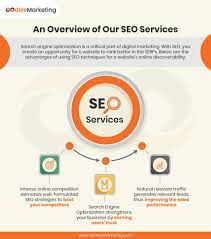PPC Advertising Management: Maximizing Your Online Campaigns
Pay-Per-Click (PPC) advertising is a powerful tool for driving targeted traffic to your website and generating leads. However, managing a successful PPC campaign requires more than just setting up ads and bidding on keywords. Effective PPC advertising management is essential to ensure that your campaigns are cost-effective and deliver the desired results.
Key Components of PPC Advertising Management:
Keyword Research: One of the first steps in PPC advertising management is conducting thorough keyword research. By identifying relevant keywords with high search volume and low competition, you can create targeted ads that reach your ideal audience.
Ad Copywriting: Compelling ad copy is crucial for capturing the attention of potential customers and encouraging them to click on your ads. A/B testing different ad variations can help you identify which messaging resonates best with your target audience.
Bid Management: Managing bids effectively is key to maximising the ROI of your PPC campaigns. By monitoring performance metrics such as click-through rates and conversion rates, you can adjust your bids to ensure that you are getting the most value from your ad spend.
Landing Page Optimization: A well-designed landing page can significantly impact the success of your PPC campaigns. By ensuring that your landing page is relevant to the ad content and provides a clear call-to-action, you can improve conversion rates and drive more leads.
The Benefits of Professional PPC Advertising Management:
While it is possible to manage PPC campaigns independently, working with a professional PPC advertising management agency can offer several advantages. Experienced professionals have the expertise and tools needed to optimise your campaigns for maximum performance and ROI.
Professional management also allows you to save time and focus on other aspects of your business while experts handle the day-to-day monitoring and optimisation of your PPC campaigns. Additionally, agencies often have access to advanced analytics tools that provide valuable insights into campaign performance.
In Conclusion
Effective PPC advertising management is essential for maximising the success of your online campaigns. By conducting thorough keyword research, writing compelling ad copy, managing bids strategically, and optimising landing pages, you can create cost-effective campaigns that drive valuable traffic to your website.
8 Advantages of PPC Advertising Management: Enhancing Targeting, Cost-Effectiveness, and Brand Visibility
- Highly targeted advertising to reach specific audiences
- Cost-effective, as you only pay when someone clicks on your ad
- Immediate visibility in search engine results
- Ability to track and measure campaign performance in real-time
- Flexible budgeting options to control ad spend
- Opportunity to test different ad creatives and messaging for optimal results
- Increases brand awareness and online presence
- Can complement SEO efforts by boosting website traffic
Challenges in PPC Advertising Management: Navigating Costs, Monitoring, and Effectiveness
- High competition for popular keywords can lead to increased bid costs.
- PPC campaigns require ongoing monitoring and adjustments to maintain effectiveness.
- Click fraud can be a concern, leading to wasted ad spend on non-legitimate clicks.
- Initial setup and management of PPC campaigns can be time-consuming for beginners.
- Inexperienced management may result in poor targeting and low conversion rates.
- Budget limitations can restrict the scalability of PPC advertising efforts.
Highly targeted advertising to reach specific audiences
One significant advantage of PPC advertising management is the ability to create highly targeted campaigns that reach specific audiences. By leveraging advanced targeting options such as demographics, interests, and behaviours, businesses can tailor their ads to reach the right people at the right time. This precision targeting not only increases the relevance of the ads but also improves the likelihood of engaging with potential customers who are more likely to convert. As a result, businesses can maximise their advertising budget by focusing on reaching audiences that are most likely to be interested in their products or services, ultimately driving higher ROI and achieving better results.
Cost-effective, as you only pay when someone clicks on your ad
One significant advantage of PPC advertising management is its cost-effectiveness, as you are only charged when a user clicks on your ad. This pay-per-click model ensures that you are not wasting budget on impressions that do not result in engagement. By paying only for actual clicks, you can maximise the efficiency of your advertising spend and target a more qualified audience who has shown interest by clicking on your ad. This results in a more targeted approach to reaching potential customers and can lead to a higher return on investment for your online campaigns.
Immediate visibility in search engine results
One significant advantage of PPC advertising management is the immediate visibility it provides in search engine results. By running targeted ads that appear at the top of search engine results pages, businesses can quickly reach their target audience and drive traffic to their website. This instant visibility allows companies to promote new products, services, or promotions effectively and increase brand awareness in a short period, ultimately leading to potential leads and conversions.
Ability to track and measure campaign performance in real-time
One significant advantage of PPC advertising management is the ability to track and measure campaign performance in real-time. This feature allows businesses to monitor the effectiveness of their ads instantly, enabling them to make immediate adjustments based on real-time data. By analysing key performance metrics such as click-through rates, conversion rates, and return on investment (ROI) in real-time, businesses can optimise their campaigns for better results and maximise their advertising budget efficiently.
Flexible budgeting options to control ad spend
One key advantage of PPC advertising management is the flexibility it offers in budgeting options, allowing businesses to have complete control over their ad spend. With PPC campaigns, you can set daily or monthly budgets based on your advertising goals and financial capabilities. This flexibility enables you to adjust your budget in real-time, depending on the performance of your ads and the results you are achieving. Whether you want to scale up your campaigns during peak seasons or reduce spending during slower periods, the ability to control ad spend gives you the freedom to optimise your budget for maximum ROI.
Opportunity to test different ad creatives and messaging for optimal results
One key advantage of PPC advertising management is the opportunity it provides to test different ad creatives and messaging for optimal results. By running A/B tests and experimenting with various ad variations, businesses can identify which creatives resonate best with their target audience and drive the highest engagement. This ability to continuously refine and improve ad content based on real-time data allows companies to maximise the effectiveness of their campaigns and ultimately achieve better ROI.
Increases brand awareness and online presence
PPC advertising management offers the significant advantage of increasing brand awareness and online presence. By strategically placing ads on search engines and relevant websites, businesses can reach a wider audience and make their brand more visible to potential customers. This increased exposure not only drives traffic to the website but also helps in building brand recognition and credibility in the competitive online marketplace. With effective PPC management, businesses can strengthen their online presence and establish themselves as industry leaders, ultimately leading to greater trust and loyalty among consumers.
Can complement SEO efforts by boosting website traffic
One significant advantage of PPC advertising management is its ability to complement SEO efforts by boosting website traffic. While SEO focuses on organic search results and long-term visibility, PPC ads can provide immediate visibility and drive targeted traffic to your website. By strategically running PPC campaigns alongside your SEO efforts, you can increase your online presence, reach a wider audience, and attract potential customers who may not have found your website through organic search alone. This synergy between PPC advertising and SEO can enhance your overall digital marketing strategy and help you achieve your business goals more effectively.
High competition for popular keywords can lead to increased bid costs.
In the realm of PPC advertising management, a significant drawback arises from the intense competition for popular keywords, resulting in escalated bid costs. As more advertisers vie for the same sought-after keywords, the bidding war drives up the prices, making it challenging for businesses with limited budgets to secure top ad placements. This increased competition not only inflates costs but also diminishes the effectiveness of campaigns, as higher bids may not always guarantee better visibility or conversions. Advertisers must navigate this con by strategizing alternative keyword approaches and focusing on niche markets to mitigate the impact of soaring bid prices on their overall campaign performance.
PPC campaigns require ongoing monitoring and adjustments to maintain effectiveness.
One significant drawback of PPC advertising management is the constant need for ongoing monitoring and adjustments to maintain effectiveness. Unlike some other forms of advertising, PPC campaigns demand regular attention to ensure that they are performing optimally. This continuous monitoring involves tracking key metrics, such as click-through rates and conversion rates, and making necessary adjustments to keywords, ad copy, and bids. Failure to consistently monitor and adjust PPC campaigns can result in wasted ad spend and diminished results, highlighting the time-consuming nature of effective PPC advertising management.
Click fraud can be a concern, leading to wasted ad spend on non-legitimate clicks.
One significant con of PPC advertising management is the issue of click fraud, which can be a major concern for advertisers. Click fraud occurs when individuals or automated bots click on ads with no intention of engaging with the content, leading to wasted ad spend on non-legitimate clicks. This fraudulent activity not only drains advertising budgets but also skews performance metrics, making it challenging to accurately assess the effectiveness of campaigns. Advertisers must remain vigilant and implement strategies to combat click fraud to ensure that their PPC campaigns deliver genuine results and maximise ROI.
Initial setup and management of PPC campaigns can be time-consuming for beginners.
The initial setup and management of PPC campaigns can be particularly time-consuming for beginners. Understanding the intricacies of keyword research, ad copywriting, bid management, and landing page optimization requires a steep learning curve. Beginners may find themselves spending hours navigating through various tools and platforms to set up their campaigns effectively. Additionally, the continuous monitoring and adjustments needed to ensure optimal campaign performance can further add to the time commitment required for successful PPC advertising management.
Inexperienced management may result in poor targeting and low conversion rates.
Inexperienced management of PPC advertising campaigns can lead to poor targeting and low conversion rates. Without a deep understanding of keyword research and audience segmentation, inexperienced managers may struggle to reach the right audience with their ads. This can result in wasted ad spend on clicks that do not convert into leads or sales. Effective targeting is crucial for maximising the ROI of PPC campaigns, and inexperienced management may hinder the ability to attract high-quality traffic that is more likely to convert.
Budget limitations can restrict the scalability of PPC advertising efforts.
Budget limitations can pose a significant challenge to the scalability of PPC advertising efforts. When operating within a constrained budget, businesses may struggle to allocate sufficient funds to reach a wider audience or bid on competitive keywords. This can limit the potential growth and impact of PPC campaigns, hindering the ability to maximise reach and achieve desired results. Without adequate financial resources, businesses may find it challenging to expand their PPC advertising efforts effectively and compete with larger competitors in the digital space.



